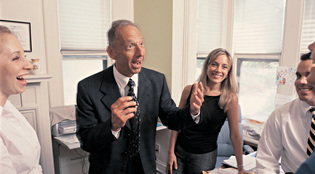 loading
loading
Light & VerityInnovative parenting clinic faces closing Mark OstowAlan Kazdin talks with colleagues about his Parent Management Training program. View full imageAlan Kazdin has spent the last two decades helping desperate parents of misbehaving children. Now he himself is desperate -- for funding to sustain his Yale Parenting Center and Child Conduct Clinic. The clinic treats what Kazdin calls the nation's “most expensive mental health problem.” But without an infusion of cash, he says, it will close next year. Talk therapy brings little change. What does work is training parents to train their children. Over the years, Kazdin and the clinic garnered millions of dollars in grants from the National Institutes of Health to research treatments for severely aggressive and antisocial kids. They found that standard talk therapy brings little change. What does work, Kazdin says, is training parents to train their children. Parent Management Training (PMT) works not only for kids who “beat up their teachers and set fires,” in Kazdin's words, but also for the tantrums and battles that mark most ordinary childhoods. But the NIH grants were earmarked for research, not for treatment or dissemination. “Essentially, we met the goals,” Kazdin says. Then the money dried up, leaving the clinic holding a bag full of valuable knowledge but no way to spread it around. “If you finally get a cure for cancer, all the hospitals would adopt it fast, because the drug companies would be pushing it and patients would be demanding it,” says Kazdin, the John M. Musser Professor of Psychology and Child Psychiatry. But “there aren't market forces that get effective [child behavior] interventions out there.” Kazdin's research indicates that kids need not just praise but effusive praise. Rewards need to be immediate and calibrated, with praise and a small prize given for even a little bit of improvement. The payoff: 78 percent of severely disturbed children “get much better,” Kazdin says, offering a slew of internal studies to prove the effectiveness of PMT and of a second therapy that teaches kids problem-solving skills. Most of the clinic's patients are local, but as word spreads, families have flown in from as far as Hawaii and Panama. About 20 percent of clients receive Medicaid; fees are on a sliding scale. But with the grants gone, the clinic can no longer afford its $370,000 annual budget. The clinic has raised fees, started offering professional workshops, and begun live web video sessions for families who can't come to New Haven. And Kazdin hopes to fund-raise. The provost's office has provided money to keep the clinic alive until early next year. “I have a life raft on loan for just a little while,” Kazdin says. “Then, I go back to drowning.”
The comment period has expired.
|
|